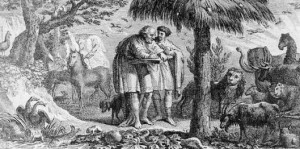 Aristotle deliberating on the nature of humans and other animals
Aristotle deliberating on the nature of humans and other animalsIt’s Our Nature
Many New York State School districts hold one of their professional development days on Election Day and the confluence of this year’s Superintendents’ Conference Day, Election Day and Thanksgiving has made for an extended period of talking about talking. The school district in which I work elected to use an Edcamp-style conference. The Edcamp format allows for any participants to propose workshops or roundtable discussions on the spot. Topics often emerge organically, spontaneously and democratically. It’s a great way to discuss specific challenges, to share ideas about what seems to work and to find out what’s on people’s minds.
The election was on a lot of people’s minds. Several of the workshops I attended were made up of high school humanities teachers who admitted that they were sometimes afraid to introduce or entertain extended discussion of the Trump and Clinton campaigns or of some of the underlying issues that animated those campaigns. In some cases it was because students were ill-informed. In some cases students were reportedly incapable of rational discussion or of respecting their classmate’s opinions.
That night, as it became increasingly clear that Donald Trump would win the presidency, I kept an eye on Twitter and texted with friends and colleagues. Most of the people with whom I kept in touch were astonished. The next day and in the days that followed many of my educator friends were angry. A few colleagues and mentors appeared traumatized, inconsolable and, though normally civil and professional, were dropping F-bombs on social media as they tried to get past their incredulity. Others seemed to be in mourning or were exploring ways to fight for the causes they believed were under threat.
Meanwhile, we all had to head into Thanksgiving knowing that we would be breaking bread with loved ones who voted differently than us and with whom we sometimes had passionate disagreements. On the most American of holiday’s many of us abided by house rules against talking about the election.
It is a little unnatural to avoid political discourse among family members. I tend to agree with Aristotle that we are by nature political animals and that our ability and responsibility to deliberate are tied to our unique powers of speech.
“Nature” says Aristotle, “… makes nothing in vain and man is the only animal whom she has endowed with the gift of speech.” Speech “…is intended to set forth the expedient and the inexpedient, and therefore likewise the just and the unjust. …and the association of living beings who have this sense makes a family and a state.” (Aristotle, 1908, pp. 28-29)
The Thanksgiving holiday is over now. We are back at work. And, as educators, talking with students about controversial issues is a part of our job that we must ernestly shoulder. Moreover, we might consider the possibility that the outcome of the recent election was in part due to our failure, as a polity, to speak civilly about the issues that seem to divide us.
Aristotle (1908). Politics, Book I. (Benjamin Jowett, Trans.) Oxford: Clarendon Press